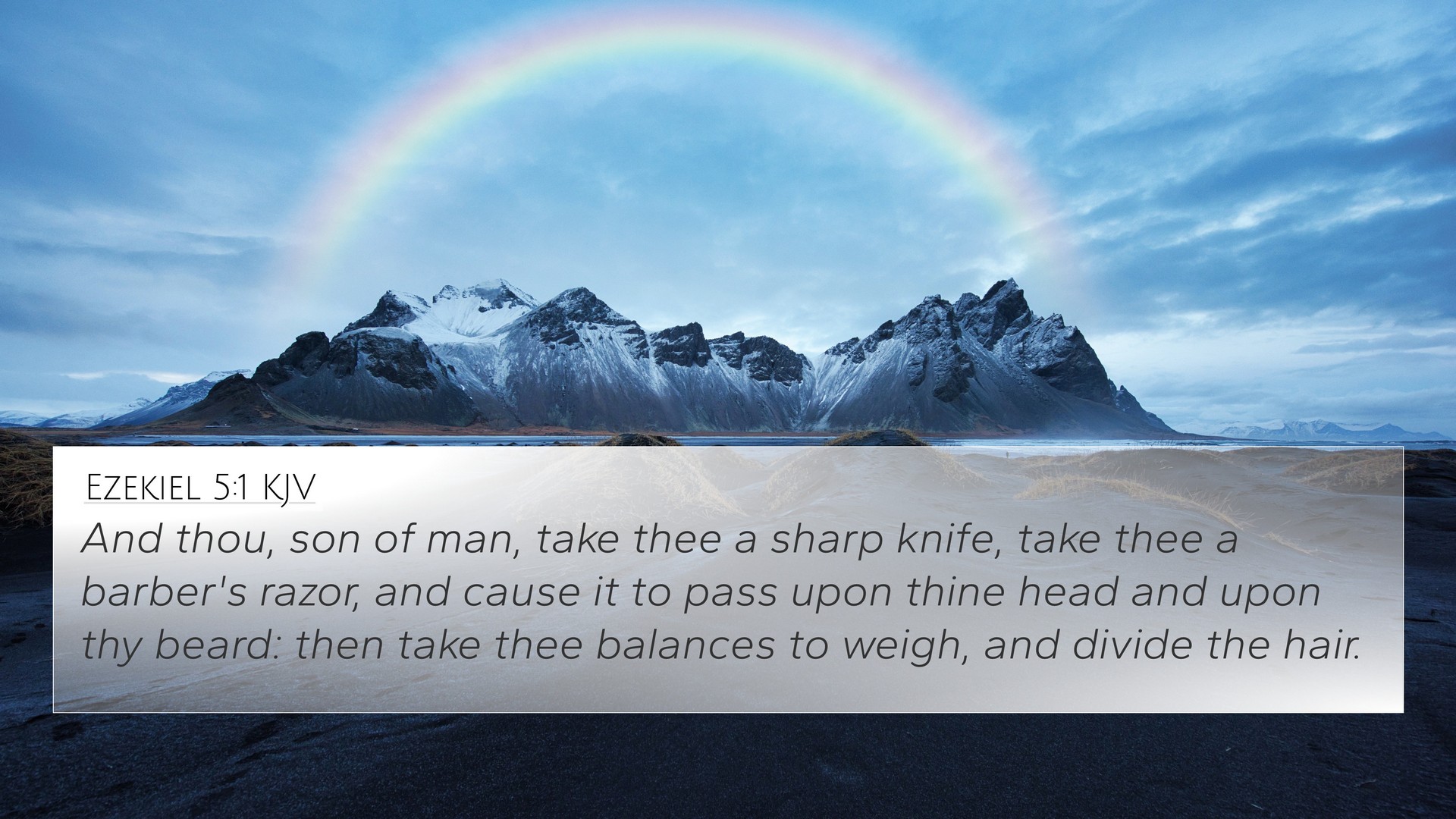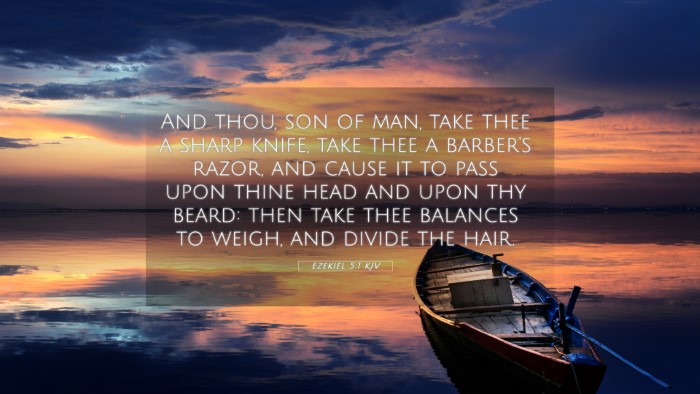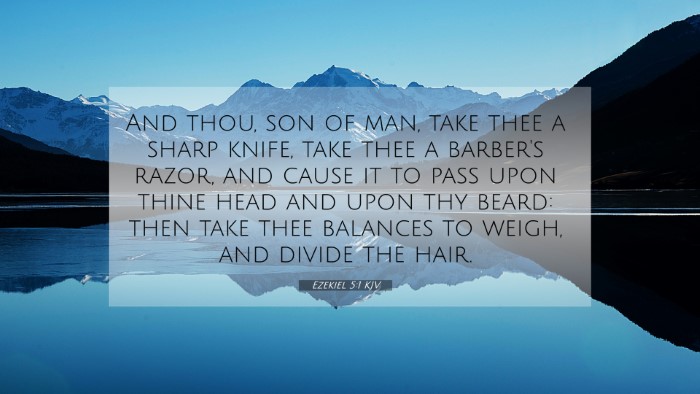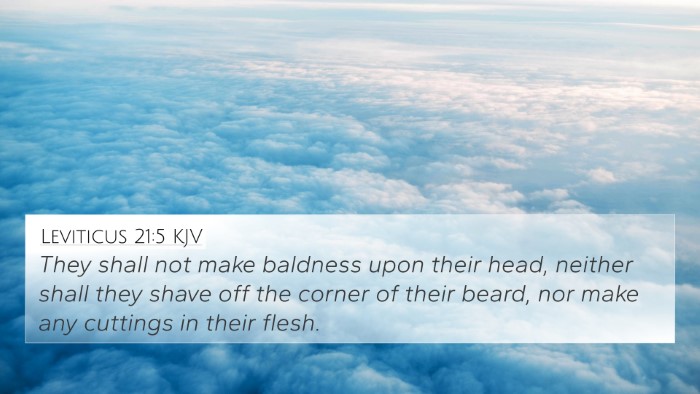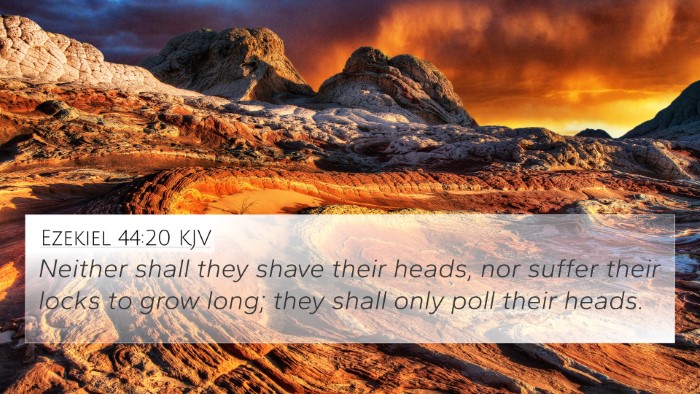Ezekiel 5:1 - Summary and Interpretation
Ezekiel 5:1 states: "And thou, son of man, take thee a sharp knife, take thee a barber's razor, and cause it to pass upon thy head and upon thy beard: then take thee balances to weigh, and divide the hair." This verse is a vivid and symbolic representation used by the prophet Ezekiel to convey God's message regarding judgment and the fate of Jerusalem.
Overview of Ezekiel 5:1
The command given to Ezekiel combines several significant actions that have profound meaning. The sharp knife and barber’s razor signify a drastic cut, representing the impending judgment and destruction of Jerusalem. This imagery serves to prepare the people for the seriousness of their sin and the consequences that follow. Ezekiel, acting as a prophet, becomes a living example of God's message to His people.
Commentary Insights
-
Matthew Henry:
Henry explains that the symbolism of cutting the hair has significant connotations in Jewish culture as hair is often seen as a sign of strength and dignity. Its removal is a sign of humiliation and mourning, symbolizing God's displeasure with the people of Israel.
-
Albert Barnes:
Barnes identifies the act of weighing the hair as a metaphor for judgment. The act of dividing the hair implies that some will be saved while others will be lost, reinforcing the seriousness of sin and disobedience. He suggests it reflects both the severity of God's judgment and His mercy in separation.
-
Adam Clarke:
Clarke expands on the significance of the 'sharp knife' and 'barber's razor' as instruments of a radical transformation. He notes that such drastic measures illustrate God’s intentions to cleanse the people from sin, much like a haircut indicates a new beginning. This portrays the dual theme of destruction and cleansing leading to restoration for those who repent.
Thematic Connections
This verse speaks to various important themes within the broader biblical narrative, such as judgment, purification, and the call to repentance. It serves as a reminder of how closely God monitors the spiritual state of His people and the lengths to which He will go to bring them back to Himself.
Bible Verse Cross-References
- Jeremiah 25:29: This verse parallels the theme of coming judgment upon Jerusalem.
- Isaiah 7:20: Similar imagery of a razor represents God's judgment.
- Numbers 6:5: The Nazarite vow involving uncut hair highlights the significance of hair in representing a covenant with God.
- Zechariah 13:7: This reference involves the striking of the shepherd, linking the consequences of sin with divine judgment.
- Lamentations 3:30: Gives insight into the concept of submitting to God’s will in the face of suffering.
- Matthew 10:30: Raises the idea of God’s knowledge of His people, reinforcing His judgment and care.
- 1 Peter 5:5: Illustrates humility, a required trait when facing God's judgment.
- Romans 12:2: Speaks to transformation, akin to the cleansing represented in this chapter.
- Ezekiel 18:30: Encourages the Israelites to turn away from sin, echoing the call to repentance implied in the act of cutting hair.
- James 4:10: Links humbling oneself before God with the theme of repentance and restoration.
Understanding Cross-References
Engaging with Bible verses that relate to each other and cross-referencing Biblical texts provides a fuller understanding of the Scriptures. By exploring these connections, one can see the interwoven themes of judgment, mercy, and the call to repentance that are prevalent throughout the Bible. This approach fosters deeper insights and enhances the reading experience.
Tools for Bible Cross-Referencing
For those interested in conducting a cross-reference Bible study, several tools and resources are available:
- Bible Concordance: A valuable tool that lists words and phrases found in Scripture.
- Bible Cross-Reference Guide: Guides help locate related verses, enhancing understanding.
- Bible Reference Resources: Books and software provide in-depth analyses and connections.
- Comprehensive Bible Cross-Reference Materials: These can assist in drawing parallels between various texts.
Conclusion
The symbolic actions that God commands Ezekiel to perform in Ezekiel 5:1 serve as a profound reminder of the need for repentance and the seriousness of sin. Through careful study and comparative Bible verse analysis, believers can uncover rich theological insights that enhance their faith and understanding of Biblical truths.
